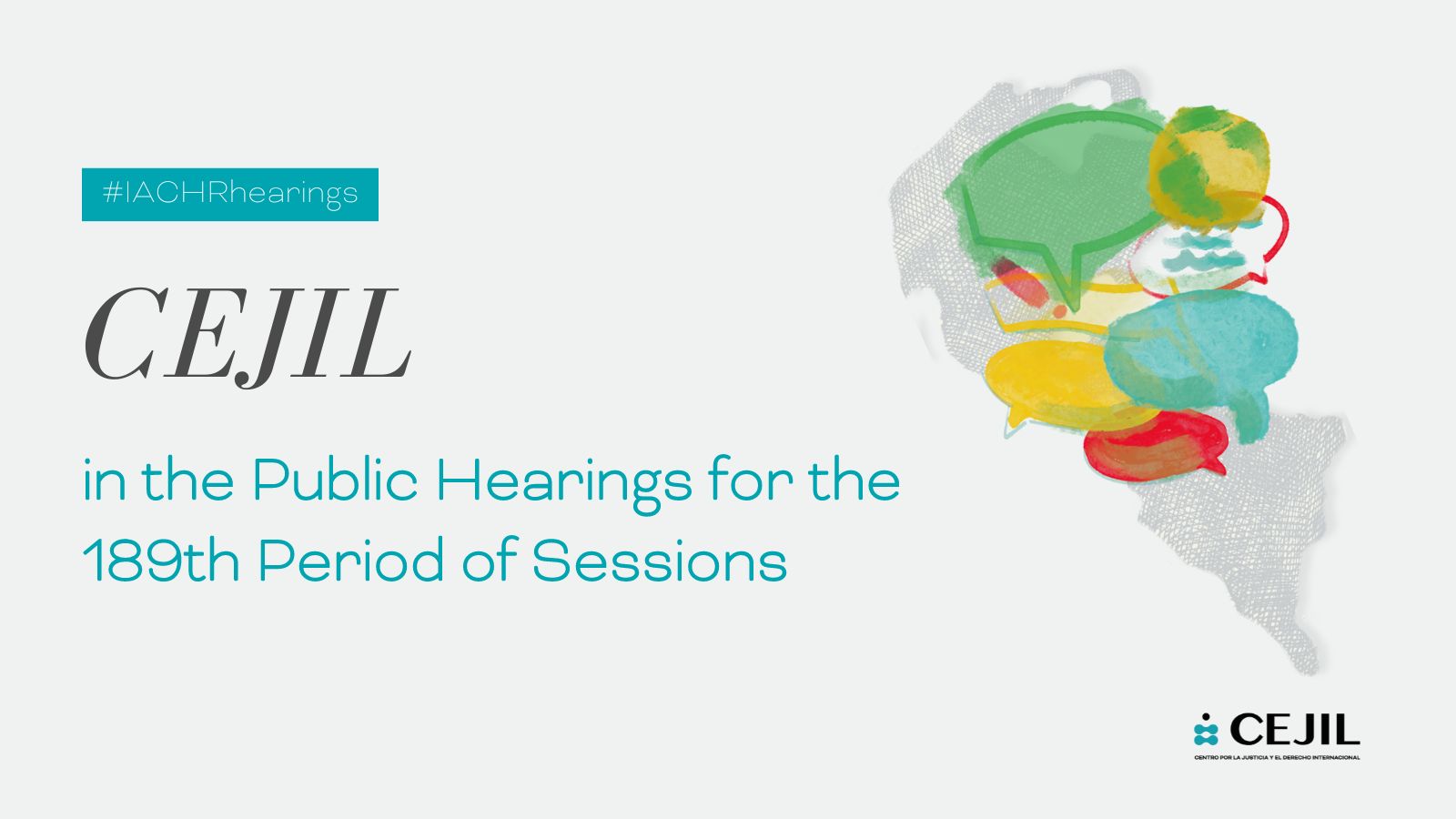






Washington, DC, March 4, 2024. The Inter-American Commission on Human Rights (IACHR) held the public hearings corresponding to the 189th period of sessions. From February 26 to March 1, 29 hearings were held at the IACHR headquarters on topics as diverse as the rights of women, children and adolescents, indigenous peoples, persons deprived of liberty, economic, social, cultural and environmental rights, and democracy, among others. These instances are a fundamental space to continue defending #rights and changing realities in the continent.
CEJIL participated in five hearings in which we presented on human rights defenders, climate emergencies and their impact on human mobility, and the weakening of democratic institutions in countries of the region.
The recordings of the hearings are available on the IACHR’s official YouTube account. Here we share those in which we have participated:
🔴Regional: Status of judicial independence
In Latin America, judicial independence has been threatened. For example, in Guatemala judges have had to go into exile or have been imprisoned for doing their job. In the rest of the region, their stability and permanence are at risk. In order to sustain democracy, it is necessary to maintain justice operators who can exercise a counterweight to the other political powers without risk to their lives, their integrity and their stability in office. In addition, another major challenge is the election process of the High Courts, where international standards that guarantee the suitability of the selected persons are often not followed. On the other hand, the gender gap continues to be very large, being far from achieving parity. Together with 10 organizations from Mexico, Colombia, Central America and the region, we presented to the IACHR the challenges in this area.
🔵 Regional: Human rights of people in human mobility due to the effects of climate change
For the first time in its history, people from communities displaced by climate change such as El Bosque (Mexico), Cedeño (Honduras), Twuliá (Colombia) and Haitian communities in Bahamas brought their testimony on climate migration. There they presented on the economic, but also human and cultural losses and damages resulting from this emergency that have forced many communities to move, relocating within their own territory or even seeking protection beyond international borders. Civil society representatives presented the regulatory gaps and legal needs for protection in the face of these types of mobility. This hearing was requested by 30 organizations from Latin America, the Caribbean and the United States in recognition of the risk and vulnerability faced by people in situations of human mobility due to the impacts of climate change.
🔵 Nicaragua: Arbitrary deprivation of liberty for political reasons
In February 2023 the world witnessed the release, banishment and arbitrary deprivation of nationality of more than 222 people who had been political prisoners, to which were added in October, 18 religious people. Despite these notorious releases, the Ortega-Murillo regime continues to deprive people considered dissidents of their freedom and to silence any opposition. To date, 91 people remain imprisoned for political reasons. 81 of them since 2018. A few months before the Nicaraguan socio-political and human rights crisis reaches its sixth anniversary, human rights organizations remind the State that it cannot dissociate itself from its international obligations.
🟢 Regional: Impacts of companies on human rights and environment
In the region, different companies are inserted in the territories to carry out extractive economic activities, implement renewable energy megaprojects, infrastructure, transportation, and monoculture projects. This generates impacts on human rights and the environment. Human rights defenders have contributed to making visible the impacts caused by irresponsible business practices that fail to comply with their duty of due diligence in their operations. According to a regional report by the Economic Research Center for Human Development on the situation faced by defenders working to advance rights within the framework of business activities, between 2015 and 2022 there had been 1976 attacks on defenders. Latin America is one of the most dangerous regions in the world for defenders who make visible the rights impacts of irresponsible business practices.
🔴Peru: Situation of the Public Prosecutor’s Office and impacts on Human Rights
Peru’s Public Prosecutor’s Office has the power to investigate and criminally prosecute the most serious illegal acts, making it a key institution in the Peruvian justice system to guarantee rights such as access to justice, the presumption of innocence and due process. Its efficient and autonomous functioning is essential for it to prosecute crimes objectively. Currently, the Public Prosecutor’s Office is being subjected to external interferences that hinder its autonomous work. In this hearing, relevant and updated information was presented on the crisis that the Public Prosecutor’s Office of Peru is going through, with an impact on its capacity to defend and protect Human Rights and the democratic order with impartiality and independence. During the hearing we sought to broaden the debate on the application of international standards on the independence of prosecutors and prosecutor’s offices, from a perspective of prevention and fight against corruption and protection of human rights in contexts of democratic crisis.
Help us continue this critical and urgent work with a donation!
DONATE NOW